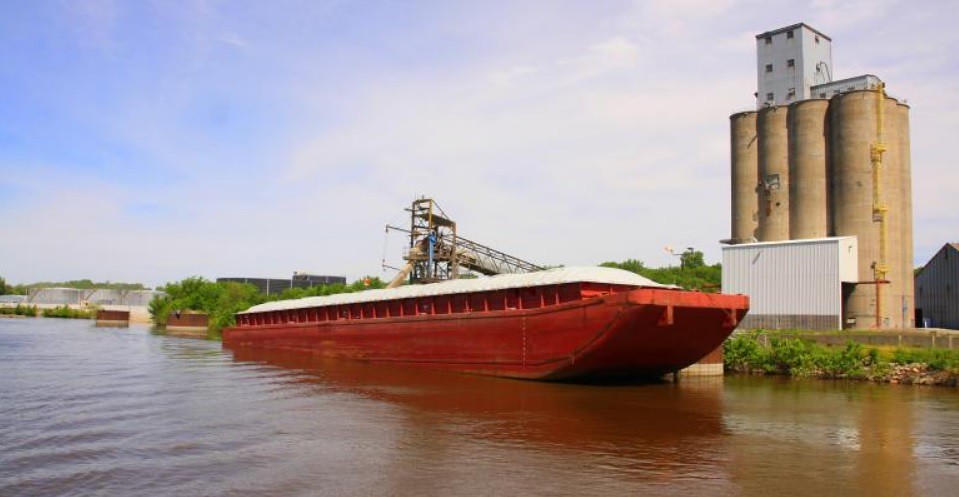Source: Post Bulletin
Depending on your exporting destination or importing origin along with the industry type, the response to the Trump Administration's tariffs program and emerging trade war is different. For the chemical industry which heavily relies on good relations with local (North and South) neighboring countries, life is acceptable - as reported recently in the chemical news. At the same time, if you are a soybean farmer or a farmer who relies on storing product in elevators for an extended period of time, trouble is approaching quickly due to trade coming to a 'stand still'. The two different scenarios are listed below - briefly.
Soybean Storage?
Early on after trade tariffs were set to take effect, I wrote a blog post discussing (briefly) the benefits of global free trade. In which, I highlighted the obvious fact that all commodities are connected to each other in some manner. Recently, the news site 'Politico Agriculture' has shed light on the connectivity which the trade industry relies on:
HIDDEN TRADE WAR IMPACT: CROP STORAGE SHORTAGE: Retaliatory tariffs have weighed down commodity prices for months. With the harvest well underway, the trade dispute with China is dealing another blow to U.S. soybean producers: a shortage of space in grain elevators that's causing major backups in states like North Dakota, Minnesota and Louisiana — and driving down prices even more.China, the biggest market for U.S. soybeans, slapped 25 percent duties on the crop in retaliation for President Donald Trump's tariffs on Chinese high-tech products. Now it's effectively closed for business to American soy growers. Some farmers are gathering more soybeans than they can sell or store, jam-packed silos are running out of room, and the trains that usually carry soybeans to the Pacific Northwest for shipping to China aren't moving."In Southwest Minnesota and the Dakotas, you now have elevators that are storing all their beans because there's no market to the West. There is absolutely no bid," said Bill Gordon, a farmer in Worthington, Minn., and member of the American Soybean Association board of directors.Gordon said some storage sites are piling corn outside to make room for soybeans, and that his local grain elevator is expected to be full after just one week of the month-long harvest.Cash prices falling: The demand for storage space is also widening the gap between the market commodity price for soybeans and the cash price farmers receive for their crops at the elevator. Grant Kimberley, director of market development for the Iowa Soybean Association, said the drop-off — or "basis" — is normally 30 to 50 cents per bushel in central Iowa. Now it's about $1 per bushel.Downstream problems: There's also a surge of Midwestern crops being shipped down the Mississippi River to New Orleans, where they're sold to Europe, South America and elsewhere. That's putting extra strain on growers and exporters in Louisiana."Everything is choking up right here on the Mississippi River on the barges and the elevators," Abraham said. "Every elevator that we have is full of soybeans right now and can literally take no more on."
Soybeans are taking up space which might be used for other crops which need to be stored too. The states being affected - North Dakota, Minnesota, and Louisiana - have around 130,000 farms (combined in 3 states). Not all of those farms serve the soybean industry. Although, that enormous number of farms could be impacted by the connectivity to other crops which need to use the same storage space used temporarily for soybean crops held up by trade tariffs.
On top of the elevators being filled up are the barges (storage boats) which are filled up with soybeans being transported to other states to be stored. Shown below is an example of a barge filled with soybean being filled. Just think of all the transportation, space, and time -- which equates to money burned -- waiting to be moved, stored, or shipped. All of the jobs which are on hold due to trade tariffs. Not cool.
Source: Feed Stuffs
Additionally, the mere fact that China can just shut down and refuse any crops from the United States shows how reliant the United States is on other countries. Which is dangerous to say the least. Our reliance to other countries for crop sales or technology processing is becoming a major issue which going forward into the future will have be heavily weighed by those in elected office who make the large decisions in Washington D.C.
Although, they are elected positions therefore, your input is imperative in driving their respective vote. With that being said, keeping up with the status of trade talks and disenfranchised farmers is important in moving forward participating in democracy. Below, the conversation shifts from grave concern now to the chemical industry. The chemical industry is quite pleased with the changes - which is strange.
Chemical Industry Is Good!
As I mentioned in the introductory paragraph, the chemical industry is one which has flourished since a deal has been arrived at between Canada, Mexico and the United States. According to the Chemistry trade journal 'C&E News' titled "U.S. chemical industry reacts positively to revised trade pact with Canada, Mexico" the deal is being cast in a positive light:
The U.S.-Mexico-Canada Agreement (USMCA) is an overhaul of the 24-year-old North American Free Trade Agreement (NAFTA), which underpins $1.2 trillion in total trade between the three countries.The trilateral accord is critically important to U.S. chemical manufacturers because Canada and Mexico are the industry’s two largest export markets. Approximately 46,000 chemical industry jobs in the U.S. now depend on trade between the North American neighbors.Although ACC and its member companies are still reviewing the provisions of the updated trade pact, the industry group says the agreement “appears to include several enhancements long sought-after by the U.S. chemical sector,” including greater regulatory cooperation.
That is not to say that other industries reliant on chemicals and pharmaceuticals are not hurting with the trade war emerging with other international countries. Noted in the article above that 46,000 jobs depend on trade. That is just one single industry - chemical industry. Imagine all other industries across the board which contribute to global trade which are being negatively impacted. The total amount of jobs which are tied to the trade of those industries. When all is considered, the numbers are enormous and difficult to comprehend.
Conclusion...
Just today in 'Politico Agriculture' was the following news:
TRADE DISPUTES LOOM OVER GLOBAL FOOD SECURITY: Trade protectionism and climate change are among the factors weighing on international food security, according to the Economist Intelligence Unit's Global Food Security Index, a benchmark used to measure individual countries' level of food security.The report, released Tuesday by EIU and DowDuPont's Corteva Agriscience, cited China's retaliatory tariffs on U.S. soybeans as an example of trade turmoil that can raise prices for consumers and hit low-income families the hardest."Protectionist trade policies can contribute to world food price increases and limit agricultural competitiveness," EIU wrote.The benchmark has the U.S. tied for third place with the United Kingdom — and down in the rankings for the second year in a row. The result doesn't indicate a worsening situation in the U.S. but, rather, slower progress on food issues than other nations. Singapore ranks No. 1, followed by Ireland in second. The Netherlands rounds out the top five.
In light of the news above, get ready for prices to change due to changing demand both internationally and within our nation. As highlighted, each of these avenues of export are tied to one another in some manner. Typically, the thought of total impact never crosses each of our minds. That needs to change with the changing times.
Instead of thinking in terms of an 'isolationist' country, the United States needs to again open up trade avenues to disseminate the crops which are stored and hindering profit margins of families (farm families) along with all of the other players in the trade game: tractor drivers, truckers, dock workers, mariners - captains of ships, ship manufacturers, shipping companies, traders, diplomats, local store owners, foreign store owners, Chinese supply chain. All of these players have families to support. Not to mention the amount of energy needed to move goods across supply routes nationally and internationally.
Related Blog Posts:
"Trade Not Aid" -- The Answer For Trade War!
Trade War Hurts Farmers -- From The Farmer's Mouth Directly
Parameters: How many sticks of butter are contained in 7.5 million pounds of butter?
How many cows are needed to generate 50,000 tons of beef exports?
How Many Cherries Are In 1.5 Million Shipping Boxes?
Parameters: Trade Tariffs Will Affect International Science
Parameters: Steel And Aluminum Tariffs Are Not Isolated - They Are Tied To Trading Of Other Vital Goods
Parameters: Tariffs Affect Trade In Both Directions -- In And Out Of The USA


No comments:
Post a Comment